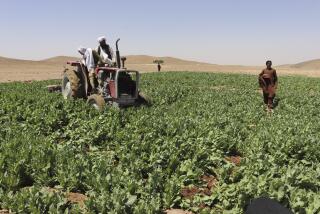Poppy Talk
- Share via
When we think of poppy seed, we usually think of Central European or Russian cookery. But the poppy plant (Papaver somniferum) is actually a native of Turkey. Poppy seed has been used by Mediterranean cooks for a long time, if not very intensively, in stews and pastries. Thousands of years ago, it spread to Iran (where it is known as khakha^sh) and India (where it is khaskhas, often spelled khus-khus, and is by no means to be confused with couscous).
It was a common flavoring for bread in medieval Italy, as Piero Camporesi tells in his book “Bread of Dreams.” You’d dip bread in eggs, then in poppy seeds, or you’d add the seed to bread dough. Sometimes it went into pasta sauce.
Camporesi spins a wild vision of medieval people doping themselves to oblivion on poppy seed bread and hemp seed bread because of the misery of their lives. Apparently, he doesn’t know that poppy seed, like hemp seed, is not the least bit psychoactive. The drug opium (which comes from a Greek word meaning “sap” or “plant juice”) is a dried form of the juice that oozes from poppy seed pods when they are scratched, but the seeds themselves are quite opium-free.
In areas where the opium poppy is grown, such as the region of Afyonkarahisar in Turkey, farm families sometimes make sweetened pastes from the whole seed pod--including both the seeds and the opium sap--which they use for soothing colicky babies. Other than that, though, the seed is the only part of the opium poppy that ever enters into cooking.


